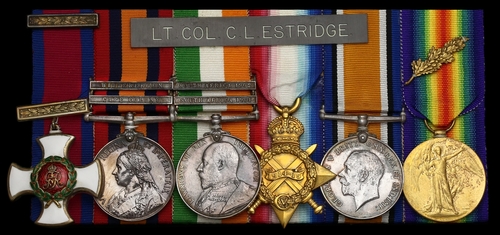
Auction: 25002 - Orders, Decorations and Medals
Lot: 173
The Great War D.S.O. group of six awarded to Lieutenant Colonel C. L. Estridge, 6th Battalion, East Yorkshire Regiment, who was wounded at Teke Tepe, later taking command of the Battalion before the Gallipoli evacuation
Distinguished Service Order, G.V.R., silver-gilt and enamel; Queen's South Africa 1899-1902, 2 clasps, Cape Colony, Wittebergen (Lieut: C. L. Estridge, 2nd E. Yorkshire Regt); King's South Africa 1901-02, 2 clasps, South Africa 1901, South Africa 1902 (Lieut. C. L. Estridge. E.York.Rgt.); 1914-15 Star (Major C. L. Estridge. E.York.R.); British War and Victory Medals (Lt. Col. C. L. Estridge.), with M.I.D. oak leaves, light contact marks to campaign awards, overall very fine (6)
D.S.O. London Gazette 1 January 1917.
M.I.D. London Gazette 4 January 1917, 27 December 1918, 4 July 1919.
Cecil Loraine Estridge studied at Harrow School before joining Trinity College, Cambridge and matriculating in 1895. Commissioned 2nd Lieutenant on 10 May 1898 into the Militia Battalion of the Yorkshire and Lancashire Regiment he transferred to the East Yorkshire Regiment in 1899. Estridge saw service with this unit during the Anglo-Boer War seeing Operations in the Orange Free State including the action at Houtnek, Thoba Mountain, a battle mentioned in Churchill's history of the war. Further operations were conducted in the Orange River Colony including actions at Biddulphsberg - a notable engagement for the Guards - and Wittebergen.
Promoted Lieutenant on 5 April 1901, in place of Lieutenant J. R. Key who died of wounds, Estridge finished the war in that rank. He was further advanced Captain on 10 May 1910 but resigned his commission not long afterwards on 3 September 1910. Like so many of the outbreak of the Anglo-Boer War he returned to the Colours, keeping his rank and re-joining the East Yorkshire Regiment on 19 August 1914. No doubt due to his experience he was advanced Major on 1 February 1915 with an appointment to Adjutant of the 6th Battalion.
Entering the War at Gallipoli on 14 July 1915 he joined the Regiment there in the Suvla Bay landing area. They went into action at Tekke Tepe the next month, in a push that was sadly destined to fail, Estridge was wounded in the arm on the first day, 8 August 1915. He was fortunate however as this saved him from participating in the attack the following day which saw heavy losses including the Battalion Commander, Lieutenant-Colonel Moore.
When Estridge eventually returned from Hospital on 5 November he took command of the Battalion, being advanced Lieutenant-Colonel whilst in the role on 26 October 1915. Following his promotion and the evacuation of the Peninsula it is unclear what path his career followed however he seems to have been given command of a prisoner camp.
His promotion to Lieutenant-Colonel was confirmed on 9 April 1919 however not long later his name was to appear alongside a scandal in the press. It appeared that, whilst only a Lieutenant, Estridge had an affair with a brother officer's wife who had since acknowledged the relationship upon leaving her husband. Perhaps due to this he appears to have maintained a low profile after the war, eventually retiring to Guildford.
Notably during the Second World War Estridge was appointed the A.R.P. Officer for the Guildford Rural District. Eventually in 1942 he appears to have been advanced Chief Warden for the District of Wyke and Normandy; sold together with copied research.
Subject to 20% VAT on Buyer’s Premium. For more information please view Terms and Conditions for Buyers.
Sold for
£2,200
Starting price
£600




